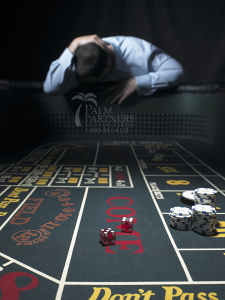Author: Justin Mckibben
Addiction is not a word that is limited to alcohol and illicit narcotics, it is an illness that comes in several forms of behavioral health issues that sometimes can fly a little longer under the radar as a result of being more socially acceptable. Gambling addiction is an impulse-control disorder, because the individual has no ability to control the impulse to gamble once it takes hold. Gambling addicts do not have to gamble every day, and the issue is not that they cannot afford it, it is the stain compulsive gambling puts on every aspect of their lives.
Gambling Addiction: Compulsive Gambling
Compulsive gambling (pathological gambling) is when an individual who is unable to resist their impulses to gamble, be it on the slots at a casino, card games and dice, or even betting on sporting events. Gambling addiction often even creates severe personal, social, and obviously financial consequences. The urge to gamble becomes so great that tension can only be relieved by more compulsive gambling.
There is a very fine line between gambling a little too much and compulsive gambling. The critical sign of gambling addiction is often hidden from the persons own awareness by things like denial. Many compulsive gamblers typically do not know they have a problem. Admitting you have a problem, or may have a problem, is the first step to recovery from gambling addiction. Unfortunately this realization normally only surfaces when a compulsive gambler hits some form of what is typically called a ‘rock bottom’ which is not always the same for everyone.
Although some people like to gamble occasionally, those who struggle with a compulsive gambling addiction usually progresses from occasional gambling to chronic, habitual gambling. As the gambling progresses, the gambler begins to risk more—both personally and financially, often resulting in more painful personal problems, possibly even financial ruin and criminal behavior to support the gambling addiction. A gambling addiction can take a toll on your finances gradually or immediately, but either way the problem is never just about the money, it is the behavior associated with compulsive gambling.
Gambling Addiction: Symptoms
- Pathological gambling is indicated by demonstrating five or more of the following symptoms:
- Spending a lot of time thinking about gambling, such as past experiences or ways to get more money with which to gamble
- Needing compulsive gambling to reach progressively larger amounts of money to feel excitement
- Having made many unsuccessful attempts to cut back or quit gambling
- Feeling restless or irritable when trying to cut back or quit gambling
- Gambling to escape problems or feelings of sadness or anxiety
- Gambling larger amounts of money to try to recoup previous losses
- Lying about the amount of time or money spent on compulsive gambling
- Committing crimes to get money to gamble
- Losing a job, relationship, or educational or career opportunity due to compulsive gambling
- Needing to borrow money to get by due to gambling losses
Gambling Addiction: Treatment Options
Compulsive gambling addiction is a chronic disorder that will only worsen over time, causing more and more problems in the individual’s life if not treated. Treatment for compulsive gambling addictions is available, and as a behavioral health issue there are many key concepts that are used to treat other types of addictions which create effective and lasting recovery.
- Individual Psychotherapy
- Group Psychotherapy
- Support Groups
- 12 Step Groups
While temporarily giving up compulsive gambling is relatively easy, staying in recovery and making a commitment to permanent a change from gambling addiction can be a truly challenging and unpleasant experience. Maintaining recovery from compulsive gambling and is possible if you surround yourself with the right people, and get the right kind of direction and support system.
Behavioral health issues and impulse-control disorders like compulsive gambling addiction usually go hand in hand with other addictions or compulsions. Often times those who have a gambling addiction can also abuse alcohol and other substances, all to deal with more personal issues. If you or someone you love is struggling with substance abuse or addiction, please call toll-free 1-800-951-6135
